新课标人教版必修1 Unit 2 English around the world workbook课件
文档属性
| 名称 | 新课标人教版必修1 Unit 2 English around the world workbook课件 | 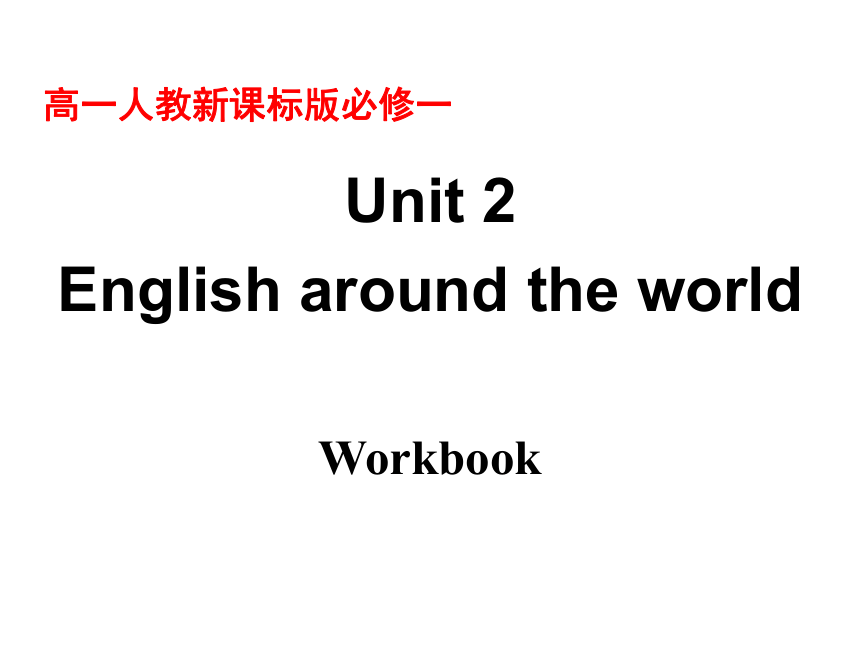 | |
| 格式 | rar | ||
| 文件大小 | 745.1KB | ||
| 资源类型 | 教案 | ||
| 版本资源 | 人教版(新课程标准) | ||
| 科目 | 英语 | ||
| 更新时间 | 2011-08-20 09:58:26 | ||
图片预览

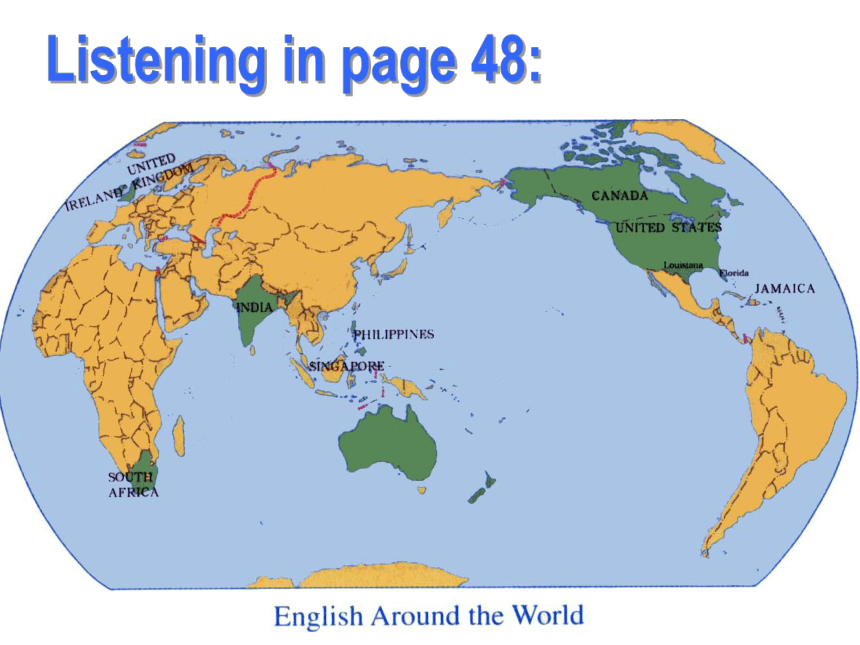
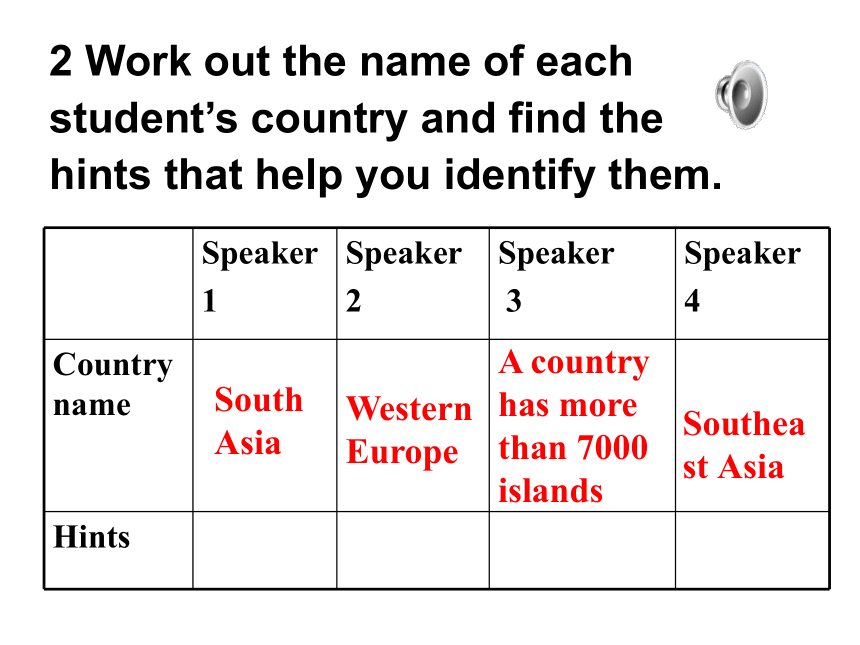

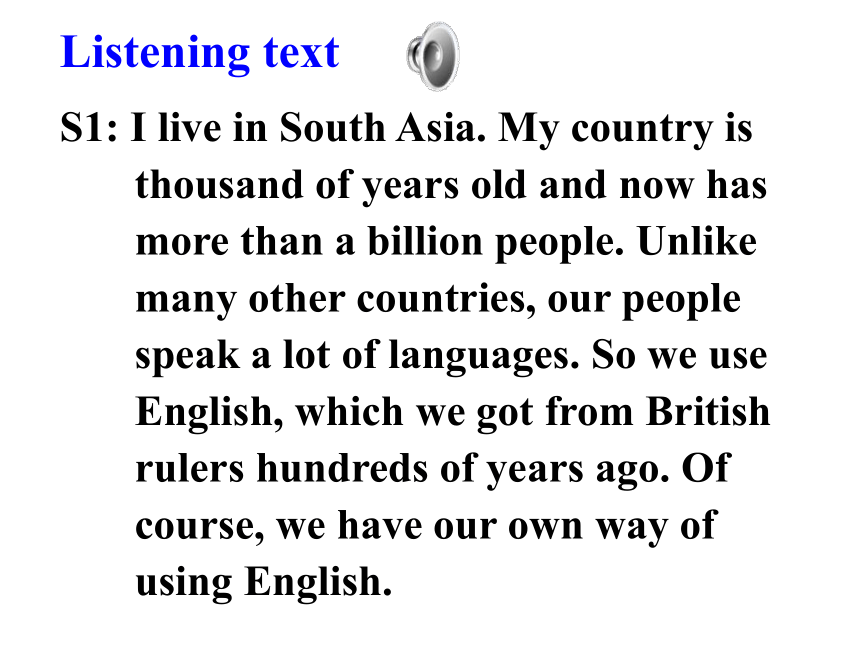
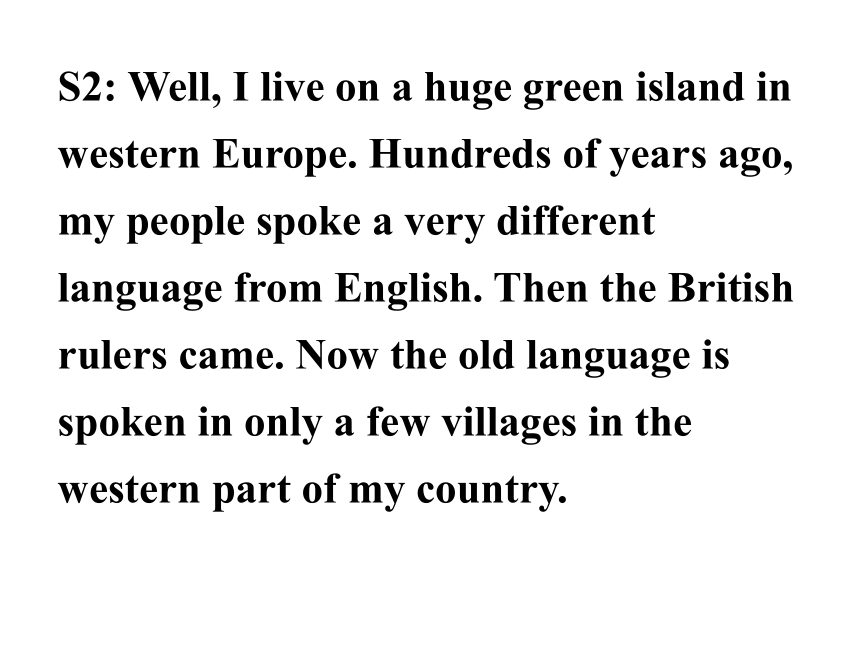
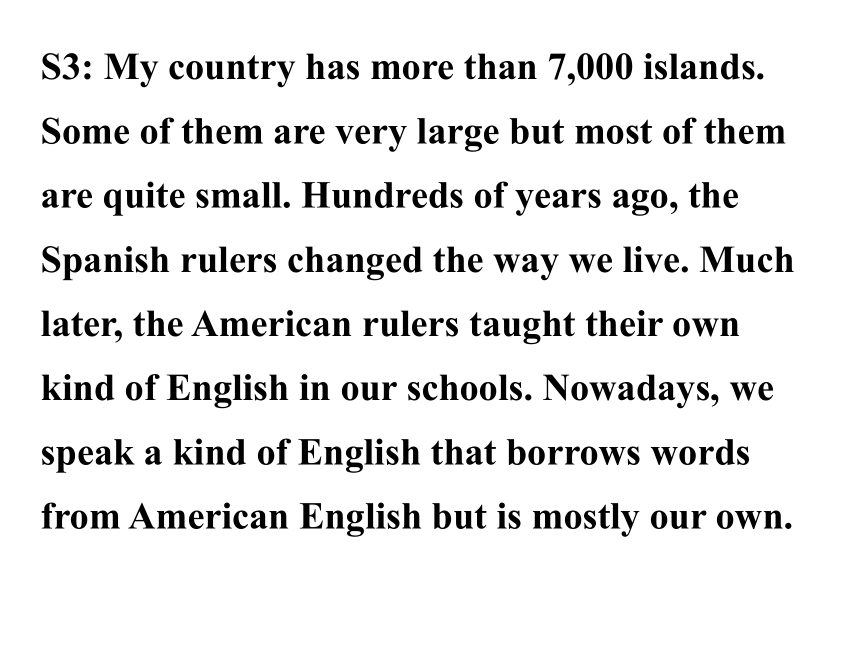
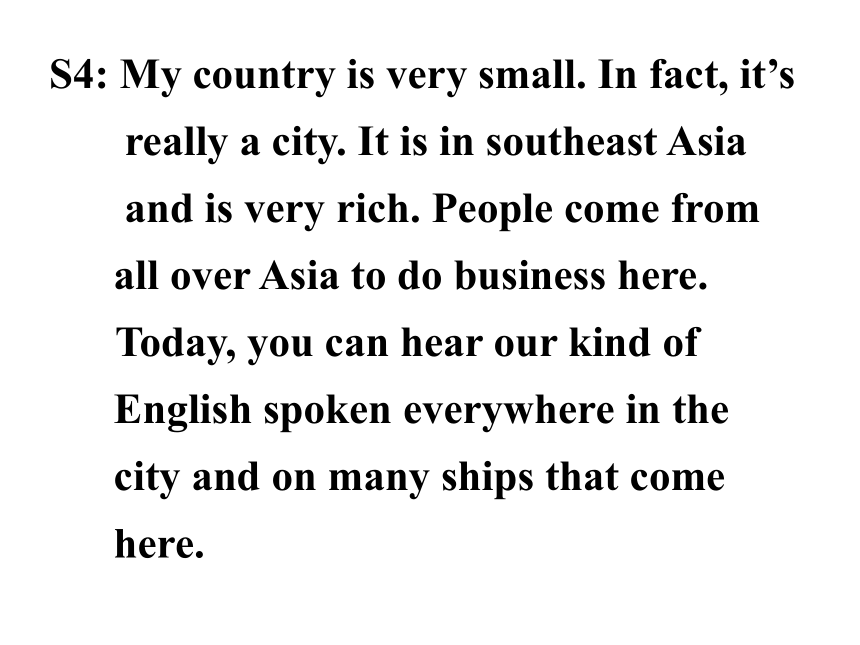
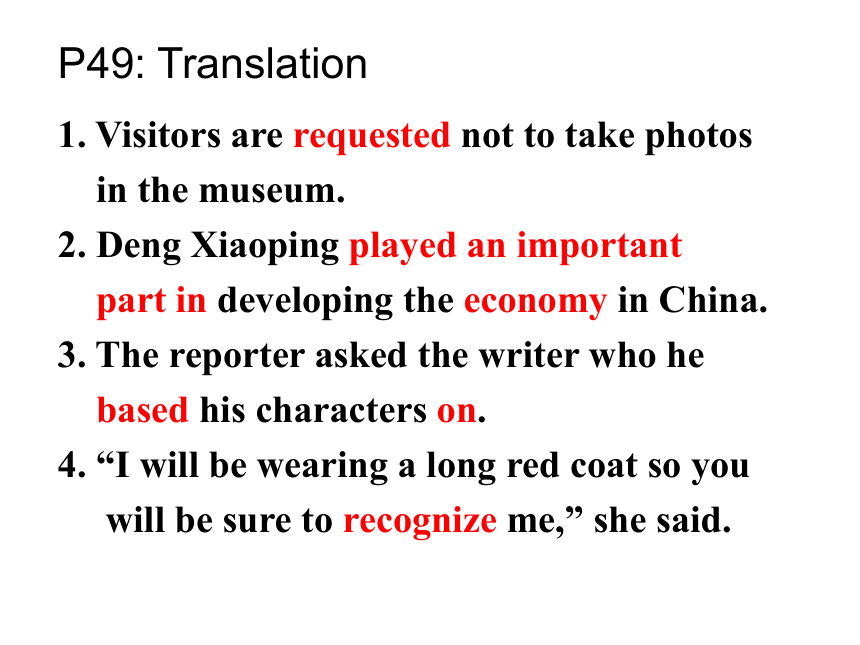
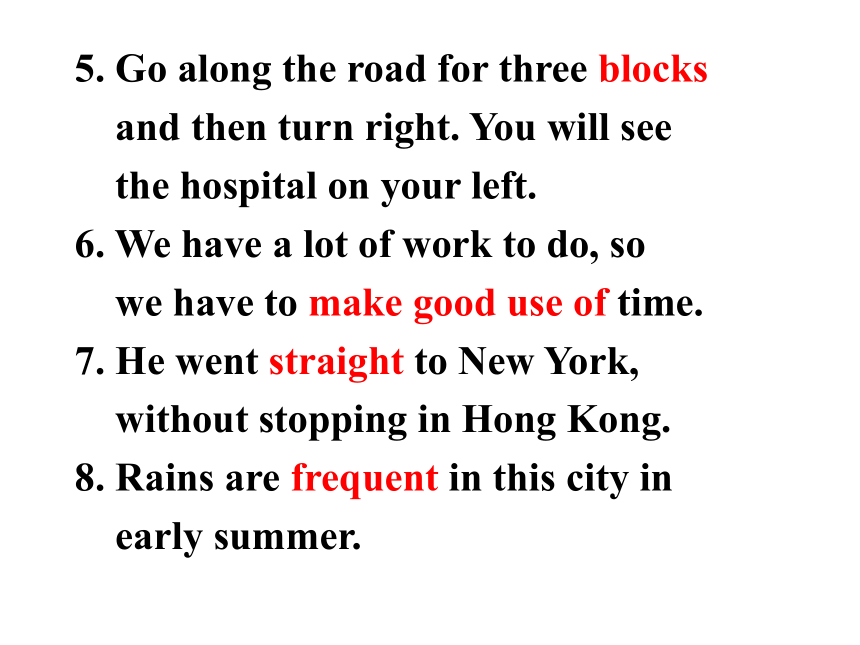

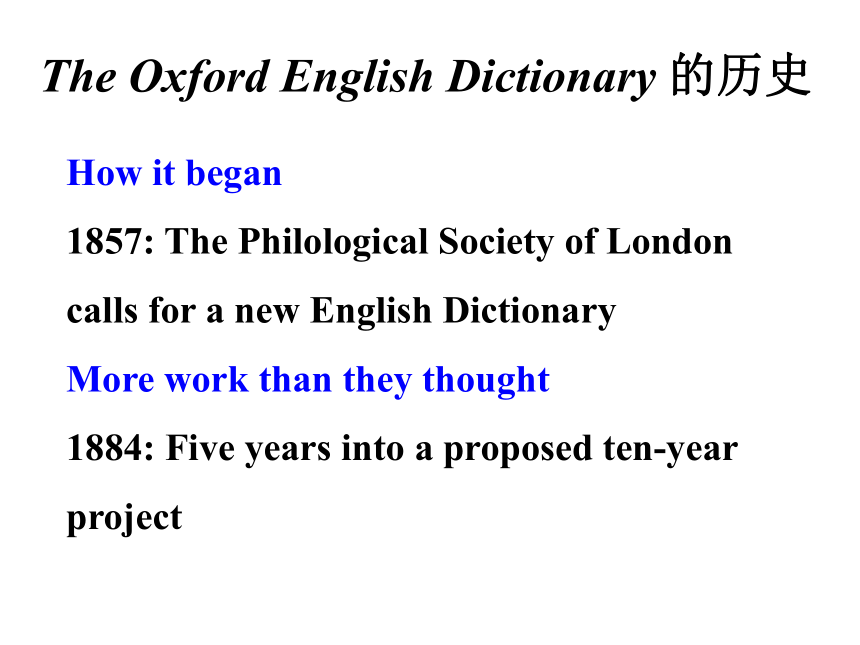
文档简介
(共57张PPT)
Unit 2
English around the world
Workbook
高一人教新课标版必修一
2 Work out the name of each
student’s country and find the
hints that help you identify them.
Speaker
1 Speaker
2 Speaker
3 Speaker
4
Country name
Hints
South Asia
Western Europe
A country has more than 7000 islands
Southeast Asia
What these countries have in common
They all speak English; they were all
Non-English speakers before being
conquered or colonized by English-speaking peoples.
S1: I live in South Asia. My country is
thousand of years old and now has
more than a billion people. Unlike
many other countries, our people
speak a lot of languages. So we use
English, which we got from British
rulers hundreds of years ago. Of
course, we have our own way of
using English.
Listening text
S2: Well, I live on a huge green island in
western Europe. Hundreds of years ago,
my people spoke a very different
language from English. Then the British
rulers came. Now the old language is
spoken in only a few villages in the
western part of my country.
S3: My country has more than 7,000 islands.
Some of them are very large but most of them
are quite small. Hundreds of years ago, the
Spanish rulers changed the way we live. Much
later, the American rulers taught their own
kind of English in our schools. Nowadays, we
speak a kind of English that borrows words
from American English but is mostly our own.
S4: My country is very small. In fact, it’s
really a city. It is in southeast Asia
and is very rich. People come from
all over Asia to do business here.
Today, you can hear our kind of
English spoken everywhere in the
city and on many ships that come
here.
P49: Translation
1. Visitors are requested not to take photos
in the museum.
2. Deng Xiaoping played an important
part in developing the economy in China.
3. The reporter asked the writer who he
based his characters on.
4. “I will be wearing a long red coat so you
will be sure to recognize me,” she said.
5. Go along the road for three blocks
and then turn right. You will see
the hospital on your left.
6. We have a lot of work to do, so
we have to make good use of time.
7. He went straight to New York,
without stopping in Hong Kong.
8. Rains are frequent in this city in
early summer.
Reading Task
The Oxford English Dictionary 的历史
How it began
1857: The Philological Society of London
calls for a new English Dictionary
More work than they thought
1884: Five years into a proposed ten-year
project
One step at a time
1884-1928: The Dictionary is published
in fascicles(分册)
Keeping it current
1933-1986: Supplements to the OED
Making it modern
1980s: The Supplements are integrated
with the OED to produce its Second Edition
Into the electronic age
1992: The first CD-ROM version of
the OED is published
The future has begun
The present: The OED is now being
fully revised, with new material
published in parts online
Do you know who is the writer of
The Oxford English Dictionary
James Murray, Samuel Johnson,
and Noah Webster.
Samuel Johnson (1709-84)
Noah Webster
James A. H. Murray
hard working, intelligent, determined, etc
Note on James Murray’s life
Country
Education
Job
Scotland
No formal education,taught
himself while working
Worked in a bank before beginning to compile the OED
Read the passage and make
notes about Murray’s life.
Note on James Murray’s life
Most important task
compiling the first edition of the OED
Its difficulties:
1 worded in a shed in his garden and behind his house
2 very cold as it was one metre underground
Note on James Murray’s life
Most important task
3 no heating; he had to wear a coat and put his
feet in a box to keep warm
4 no electric light; he worked at night with candles
Note on James Murray’s life
Most important task
Qualities needed:
1 commitment
2 perseverance
3 accuracy
Who worked on the
dictionary
Date of completion
Other information
At first just James Murray; later his two daughters; finished by others editors after his death
1928
First edition took forty-four years to compile
2 Listen to what Wang Ting and
Chen Peng have to say and find
out how they improve their English.
Write down the main idea.
Wang Ting and Chen Peng are discussing how they improve their English listening outside class.
Listening Task
3 Listen again and answer
the following questions.
1. What is Wang Ting going to do
this weekend
Wang Ting is going to buy some
CDs to improve her English.
2. What does Wang Ting think about
listening to English songs
She likes to listen to English songs to
learn idiomatic English expressions.
3. Did Chen Peng often watch English films
Does he watch them now
No, he used to watch English films.
He doesn’t watch them now as he thinks
they are too hard without Chinese subtitles.
4. What does Chen Peng like watching on CCTV 9
He likes listening to Chinese people and reading the English subtitles.
5. What does Wang Ting ask Chen Peng to do
She asks him to listen to native speakers more often.
6. What does Chen Peng’s teacher say about learning English What does she mean
The teacher asks him to learn “little and often”. She means that he should do a little extra listening every day to make the best improvement.
4 Write down the three ways Wang
Ting suggests to improve English skills.
1. Listening to ____________ is an easy
way to _____ some idiomatic __________.
2. Watching _________________________
___________ is a good way to ________
your _____________ of English.
3. Listening to _________________ can
improve your _____________.
English songs
learn
expressions
the news and the interviews on CCTV 9
practise
understanding
the native speakers
listening skills
Listening text
CP= Chen Peng (male) WT= Wang Ting
C P: What are you doing this weekend, Wang Ting
WT: I’m going to buy some CDs to improve my English.
C P: What Are you kidding
WT: No, I often listen to English songs and learn them. It’s an easy way to learn some idiomatic English expressions. Sometimes I watch films too.
C P: No, not me! I used to watch English films but I can’t understand them without the Chinese subtitles. I think English is too hard.
WT: You give up too easily. Why not watch CCTV 9 or listen to songs like me
C P: I sometimes do that. I like watching the news and the interviews on CCTV 9. They often have Chinese people talking and they give subtitles in English to explain what they are saying. I find that very useful.
WT: Yes, that’s a good way to practise your understanding of English. Why don’t you also listen to the native speakers and improve your listening skills
C P: Yes, I think I’ll do that more regularly. My teacher always says that “little and often” is the way to learn. She’ll be proud of me!
WT: I’m sure she will.
1) 标准时间
2) 扮演一个角色
3) 两本这样的书
4) 东欧
5) 信不信由你
6) 至今
1) standard time
2) play a part/role
3) two such books
4) Eastern European
5) believe it or not
6) to this day
Phrases
7) 挤(出去)
8) 想起
9) 全世界
10) 做某事最快的方法
11) 多于, 不只是
12) 不同于
13) 在……中起重要作用
7) push one’s way
8) think of
9) all over the world
10) the quickest way to do/
of doing sth
11) more than
12) be different from
13) play an important
role/part in……
14) 讲英语的当地人
15) 比以前任何时候
16) 打算干某事
17) 互相
18) 与…….交流
19) 以……为基
20) 国际贸易
14) the native speakers
of English
15) than ever before
16) mean to do sth
17) one another/each other
18) communicate with
19) be based no
20) international trade
1. Do you know the d_________ between
American English and British English
2. He played the leading r____ in our
school play.
3. What is your p______ job
4. His n_____ language is not English but
Chinese, though he speaks English excellently.
5. Recently he has made r______ progress
in English.
一、根据句意及首字母填空。
ifferences
ole
resent
ative
apid
6. We are asked to learn about some
______________(交际) skills in this unit.
7. He has a very large ___________(词汇量).
8. The ____________(政府) will do something
to stop pollution.
9. The tow countries have different
________(文化).
10. ________(实际上), it was based more
on German than present English.
vocabulary
Actually
cultures
government
communicating
11. Do you always speak s_________Chinese
12. I didn’t r_________ your voice on the
phone at first.
13. I like the country, e_________ in spring.
14. They s_____ their joys and sorrows.
15. When Americans buy a ticker for the
subway,Englishmen would buy it for
the u____________.
ecognize
tandard
specially
hare
nderground
16. Most of the parents ________ (期望)
their children to go to University.
17. I must make a _______(清单) of
the things to buy.
18. A new year is ____________(临近)
19. You’ll find several shops in the
_____________(附近).
20. They _______(共住) a hotel room that night.
approaching
list
expect
neighborhood
shared
for example
a set of rooms for living in
really; in fact
a machine for moving people
or things up and down
People who has spoken
English since birth
visit a place
have a part in
the way that words
are used in a language
1. actually
2. elevator
3. native English
speaker
4. come up
5. such as
6. apartment
7. usage
8. play a role in
二、连线
1. All the people _________ at the party
were his supporters.
A. present B. thankful
C. interested D. important
2. I think good use should be ________ of the
information to get our product sales increased.
A. taken B. made C. brought D. put
3. Some people think that their jobs should
_________ their own interest.
A. be based on B. base on
C. be basing on D. be base on
三、选择
A
B
A
4. We all have a part to ________ in the
fight against crime.
A. play B. take C. playing D. taking
5. It was not ________ that native speakers
don’t know grammar very well.
A. surprise B. surprising
C. surprised D. surpises
6. Spring is coming and the grass is just
beginning to ________.
A. come along B. come up
C. come with D. come through
A
B
B
7. He lives three ________ away from here.
A. blockings B. buildings
C. streets D. blocks
8. The boy often ________ money from his
grandparents.
A. requests B. orders
C. tells D. commands
9. He likes to help others ________ he is
very busy.
A. because B. if C. even D. even if
D
A
D
10. The film was made ________ the World
War II.
A. base on B. based on
C. base in D. based in
11. There are twenty students who are going
to have a picnic on Sunday, six girls
________.
A. include B. included
C. including D. includes
B
B
12. Did you have any difficulty ________
the question
A. to answer B. answering
C. having answered D. answered
13. The number of people invited to
the party ________ sixty, but a
number of them ________ absent.
A. were; was B. was; was
C. was; were D. were; were
B
C
四、用because或why填空。
a) He is not here. This is _________ he is ill.
b) He missed the bus. This is ______
he was late for school.
用for example, namely 或such as填空。
a) ______________, John has the same
to opinion.
b) Some programs _________ Follow Me
is useful to us.
because
why
For example
such as
c) Only two persons can do the job,
_________ you and I.
d) Some students, _____________, John,
lives in the neighborhood.
e) I visited several cities __________
New York, Chicago and Boston.
f) There are many kinds of pollution,
___________, noise is a kind of pollution.
namely
for example
such as
for example
1. 我想找到学好英语的方法。(way)
2. 这篇新闻报道以事实为根据。(news report)
3. 我有两本这样的书。(such)
I want to find the way to learn English well.
This news report is based on fact.
I have two such books.
4. 尽管10年没看到Tom了, 但我认出了他。
(recognize)
5. 我本无意伤害你。(mean)
6. 所有的理论(theory)都应该以实践为基础。
All theories should be based on practice.
I recognized him although
I hadn’t seen him for 10 years.
I didn’t mean to hurt you.
7. 我的家乡是一个和我小孩时不一样的地方了。
My hometown is a different place from
what it was when I was a child.
8. 我家离车站很近, 所以来自四面八方的公交
车常常挡了我的道。
My house is close to the bus stop, so buses
coming in all directions are often in my way.
9. 顺便问一下, 你能区分直接引语和间接英语吗
By the way, can you tell direct speeches
from indirect speeches
10. 相当多的科学家出席了这次会议, 出席
这次会议的科学家的人数达到200多。
A number of scientists have been present
at the meeting. The number of the
scientists present at the meeting comes
to more than 200.
11. 信不信由你, 甚至在冬季也有新竹笋从
老竹根周围长出。
Believe it or not, new shoots of bamboo
come up from around the roots of old
ones even in winter.
12. 虽然他在这场电视剧中扮演国王, 但他
在这场电视剧中并没有起重要作用.
Though he plays a role of the king in the
TV play, he doesn’t play an important
part in it.
13. 尽管他过去的学习并不比他同学好, 但不止
一个学生把他不只是当同学, 还把他当成
是朋友。他们相互帮助, 并且充分利用时间
学习。信不信由你, 用这种方法, 目前他们
的学习都有了很大的进步(make rapid
progress in)。
Even though he didn’t study better than his
classmates, more than one student thinks him
as more than a classmate and also a friend.
They helped each other and made full use of
time to study. Believe it or not, in this way/by
this means they have made rapid progress in
study at present.
A Joke
Two mice sat in their hole watching Cat lurk
(潜伏) outside. “I know how to make Cat go
away,” said the first mouse. “How ” the
second mouse asked in surprise.
“Watch! Bow, wow!!!(汪汪汪)”, barked the
first mouse. Peering (仔细瞧)through their hole
in the wall, they saw Cat running away in fear.
“Ah, see the benefit(益处) of knowing
another language!”
Homework
1. Try to remember the English
meaning of the new words and
expressions.
2. Finish the exercises 1 and 2
on page 49.
Unit 2
English around the world
Workbook
高一人教新课标版必修一
2 Work out the name of each
student’s country and find the
hints that help you identify them.
Speaker
1 Speaker
2 Speaker
3 Speaker
4
Country name
Hints
South Asia
Western Europe
A country has more than 7000 islands
Southeast Asia
What these countries have in common
They all speak English; they were all
Non-English speakers before being
conquered or colonized by English-speaking peoples.
S1: I live in South Asia. My country is
thousand of years old and now has
more than a billion people. Unlike
many other countries, our people
speak a lot of languages. So we use
English, which we got from British
rulers hundreds of years ago. Of
course, we have our own way of
using English.
Listening text
S2: Well, I live on a huge green island in
western Europe. Hundreds of years ago,
my people spoke a very different
language from English. Then the British
rulers came. Now the old language is
spoken in only a few villages in the
western part of my country.
S3: My country has more than 7,000 islands.
Some of them are very large but most of them
are quite small. Hundreds of years ago, the
Spanish rulers changed the way we live. Much
later, the American rulers taught their own
kind of English in our schools. Nowadays, we
speak a kind of English that borrows words
from American English but is mostly our own.
S4: My country is very small. In fact, it’s
really a city. It is in southeast Asia
and is very rich. People come from
all over Asia to do business here.
Today, you can hear our kind of
English spoken everywhere in the
city and on many ships that come
here.
P49: Translation
1. Visitors are requested not to take photos
in the museum.
2. Deng Xiaoping played an important
part in developing the economy in China.
3. The reporter asked the writer who he
based his characters on.
4. “I will be wearing a long red coat so you
will be sure to recognize me,” she said.
5. Go along the road for three blocks
and then turn right. You will see
the hospital on your left.
6. We have a lot of work to do, so
we have to make good use of time.
7. He went straight to New York,
without stopping in Hong Kong.
8. Rains are frequent in this city in
early summer.
Reading Task
The Oxford English Dictionary 的历史
How it began
1857: The Philological Society of London
calls for a new English Dictionary
More work than they thought
1884: Five years into a proposed ten-year
project
One step at a time
1884-1928: The Dictionary is published
in fascicles(分册)
Keeping it current
1933-1986: Supplements to the OED
Making it modern
1980s: The Supplements are integrated
with the OED to produce its Second Edition
Into the electronic age
1992: The first CD-ROM version of
the OED is published
The future has begun
The present: The OED is now being
fully revised, with new material
published in parts online
Do you know who is the writer of
The Oxford English Dictionary
James Murray, Samuel Johnson,
and Noah Webster.
Samuel Johnson (1709-84)
Noah Webster
James A. H. Murray
hard working, intelligent, determined, etc
Note on James Murray’s life
Country
Education
Job
Scotland
No formal education,taught
himself while working
Worked in a bank before beginning to compile the OED
Read the passage and make
notes about Murray’s life.
Note on James Murray’s life
Most important task
compiling the first edition of the OED
Its difficulties:
1 worded in a shed in his garden and behind his house
2 very cold as it was one metre underground
Note on James Murray’s life
Most important task
3 no heating; he had to wear a coat and put his
feet in a box to keep warm
4 no electric light; he worked at night with candles
Note on James Murray’s life
Most important task
Qualities needed:
1 commitment
2 perseverance
3 accuracy
Who worked on the
dictionary
Date of completion
Other information
At first just James Murray; later his two daughters; finished by others editors after his death
1928
First edition took forty-four years to compile
2 Listen to what Wang Ting and
Chen Peng have to say and find
out how they improve their English.
Write down the main idea.
Wang Ting and Chen Peng are discussing how they improve their English listening outside class.
Listening Task
3 Listen again and answer
the following questions.
1. What is Wang Ting going to do
this weekend
Wang Ting is going to buy some
CDs to improve her English.
2. What does Wang Ting think about
listening to English songs
She likes to listen to English songs to
learn idiomatic English expressions.
3. Did Chen Peng often watch English films
Does he watch them now
No, he used to watch English films.
He doesn’t watch them now as he thinks
they are too hard without Chinese subtitles.
4. What does Chen Peng like watching on CCTV 9
He likes listening to Chinese people and reading the English subtitles.
5. What does Wang Ting ask Chen Peng to do
She asks him to listen to native speakers more often.
6. What does Chen Peng’s teacher say about learning English What does she mean
The teacher asks him to learn “little and often”. She means that he should do a little extra listening every day to make the best improvement.
4 Write down the three ways Wang
Ting suggests to improve English skills.
1. Listening to ____________ is an easy
way to _____ some idiomatic __________.
2. Watching _________________________
___________ is a good way to ________
your _____________ of English.
3. Listening to _________________ can
improve your _____________.
English songs
learn
expressions
the news and the interviews on CCTV 9
practise
understanding
the native speakers
listening skills
Listening text
CP= Chen Peng (male) WT= Wang Ting
C P: What are you doing this weekend, Wang Ting
WT: I’m going to buy some CDs to improve my English.
C P: What Are you kidding
WT: No, I often listen to English songs and learn them. It’s an easy way to learn some idiomatic English expressions. Sometimes I watch films too.
C P: No, not me! I used to watch English films but I can’t understand them without the Chinese subtitles. I think English is too hard.
WT: You give up too easily. Why not watch CCTV 9 or listen to songs like me
C P: I sometimes do that. I like watching the news and the interviews on CCTV 9. They often have Chinese people talking and they give subtitles in English to explain what they are saying. I find that very useful.
WT: Yes, that’s a good way to practise your understanding of English. Why don’t you also listen to the native speakers and improve your listening skills
C P: Yes, I think I’ll do that more regularly. My teacher always says that “little and often” is the way to learn. She’ll be proud of me!
WT: I’m sure she will.
1) 标准时间
2) 扮演一个角色
3) 两本这样的书
4) 东欧
5) 信不信由你
6) 至今
1) standard time
2) play a part/role
3) two such books
4) Eastern European
5) believe it or not
6) to this day
Phrases
7) 挤(出去)
8) 想起
9) 全世界
10) 做某事最快的方法
11) 多于, 不只是
12) 不同于
13) 在……中起重要作用
7) push one’s way
8) think of
9) all over the world
10) the quickest way to do/
of doing sth
11) more than
12) be different from
13) play an important
role/part in……
14) 讲英语的当地人
15) 比以前任何时候
16) 打算干某事
17) 互相
18) 与…….交流
19) 以……为基
20) 国际贸易
14) the native speakers
of English
15) than ever before
16) mean to do sth
17) one another/each other
18) communicate with
19) be based no
20) international trade
1. Do you know the d_________ between
American English and British English
2. He played the leading r____ in our
school play.
3. What is your p______ job
4. His n_____ language is not English but
Chinese, though he speaks English excellently.
5. Recently he has made r______ progress
in English.
一、根据句意及首字母填空。
ifferences
ole
resent
ative
apid
6. We are asked to learn about some
______________(交际) skills in this unit.
7. He has a very large ___________(词汇量).
8. The ____________(政府) will do something
to stop pollution.
9. The tow countries have different
________(文化).
10. ________(实际上), it was based more
on German than present English.
vocabulary
Actually
cultures
government
communicating
11. Do you always speak s_________Chinese
12. I didn’t r_________ your voice on the
phone at first.
13. I like the country, e_________ in spring.
14. They s_____ their joys and sorrows.
15. When Americans buy a ticker for the
subway,Englishmen would buy it for
the u____________.
ecognize
tandard
specially
hare
nderground
16. Most of the parents ________ (期望)
their children to go to University.
17. I must make a _______(清单) of
the things to buy.
18. A new year is ____________(临近)
19. You’ll find several shops in the
_____________(附近).
20. They _______(共住) a hotel room that night.
approaching
list
expect
neighborhood
shared
for example
a set of rooms for living in
really; in fact
a machine for moving people
or things up and down
People who has spoken
English since birth
visit a place
have a part in
the way that words
are used in a language
1. actually
2. elevator
3. native English
speaker
4. come up
5. such as
6. apartment
7. usage
8. play a role in
二、连线
1. All the people _________ at the party
were his supporters.
A. present B. thankful
C. interested D. important
2. I think good use should be ________ of the
information to get our product sales increased.
A. taken B. made C. brought D. put
3. Some people think that their jobs should
_________ their own interest.
A. be based on B. base on
C. be basing on D. be base on
三、选择
A
B
A
4. We all have a part to ________ in the
fight against crime.
A. play B. take C. playing D. taking
5. It was not ________ that native speakers
don’t know grammar very well.
A. surprise B. surprising
C. surprised D. surpises
6. Spring is coming and the grass is just
beginning to ________.
A. come along B. come up
C. come with D. come through
A
B
B
7. He lives three ________ away from here.
A. blockings B. buildings
C. streets D. blocks
8. The boy often ________ money from his
grandparents.
A. requests B. orders
C. tells D. commands
9. He likes to help others ________ he is
very busy.
A. because B. if C. even D. even if
D
A
D
10. The film was made ________ the World
War II.
A. base on B. based on
C. base in D. based in
11. There are twenty students who are going
to have a picnic on Sunday, six girls
________.
A. include B. included
C. including D. includes
B
B
12. Did you have any difficulty ________
the question
A. to answer B. answering
C. having answered D. answered
13. The number of people invited to
the party ________ sixty, but a
number of them ________ absent.
A. were; was B. was; was
C. was; were D. were; were
B
C
四、用because或why填空。
a) He is not here. This is _________ he is ill.
b) He missed the bus. This is ______
he was late for school.
用for example, namely 或such as填空。
a) ______________, John has the same
to opinion.
b) Some programs _________ Follow Me
is useful to us.
because
why
For example
such as
c) Only two persons can do the job,
_________ you and I.
d) Some students, _____________, John,
lives in the neighborhood.
e) I visited several cities __________
New York, Chicago and Boston.
f) There are many kinds of pollution,
___________, noise is a kind of pollution.
namely
for example
such as
for example
1. 我想找到学好英语的方法。(way)
2. 这篇新闻报道以事实为根据。(news report)
3. 我有两本这样的书。(such)
I want to find the way to learn English well.
This news report is based on fact.
I have two such books.
4. 尽管10年没看到Tom了, 但我认出了他。
(recognize)
5. 我本无意伤害你。(mean)
6. 所有的理论(theory)都应该以实践为基础。
All theories should be based on practice.
I recognized him although
I hadn’t seen him for 10 years.
I didn’t mean to hurt you.
7. 我的家乡是一个和我小孩时不一样的地方了。
My hometown is a different place from
what it was when I was a child.
8. 我家离车站很近, 所以来自四面八方的公交
车常常挡了我的道。
My house is close to the bus stop, so buses
coming in all directions are often in my way.
9. 顺便问一下, 你能区分直接引语和间接英语吗
By the way, can you tell direct speeches
from indirect speeches
10. 相当多的科学家出席了这次会议, 出席
这次会议的科学家的人数达到200多。
A number of scientists have been present
at the meeting. The number of the
scientists present at the meeting comes
to more than 200.
11. 信不信由你, 甚至在冬季也有新竹笋从
老竹根周围长出。
Believe it or not, new shoots of bamboo
come up from around the roots of old
ones even in winter.
12. 虽然他在这场电视剧中扮演国王, 但他
在这场电视剧中并没有起重要作用.
Though he plays a role of the king in the
TV play, he doesn’t play an important
part in it.
13. 尽管他过去的学习并不比他同学好, 但不止
一个学生把他不只是当同学, 还把他当成
是朋友。他们相互帮助, 并且充分利用时间
学习。信不信由你, 用这种方法, 目前他们
的学习都有了很大的进步(make rapid
progress in)。
Even though he didn’t study better than his
classmates, more than one student thinks him
as more than a classmate and also a friend.
They helped each other and made full use of
time to study. Believe it or not, in this way/by
this means they have made rapid progress in
study at present.
A Joke
Two mice sat in their hole watching Cat lurk
(潜伏) outside. “I know how to make Cat go
away,” said the first mouse. “How ” the
second mouse asked in surprise.
“Watch! Bow, wow!!!(汪汪汪)”, barked the
first mouse. Peering (仔细瞧)through their hole
in the wall, they saw Cat running away in fear.
“Ah, see the benefit(益处) of knowing
another language!”
Homework
1. Try to remember the English
meaning of the new words and
expressions.
2. Finish the exercises 1 and 2
on page 49.
